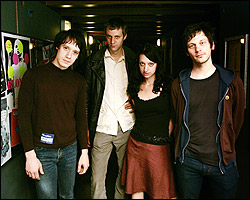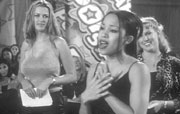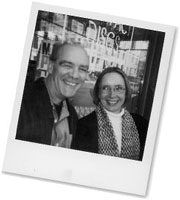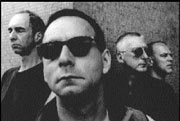My first thought upon hearing the Boggs’ We Are the Boggs We Are was that it sounded a little wrongnot the music itself, mind you, but something wasn’t quite right. But I kept listening because the songs were really good. I kept listening because the music reminded me of a train ride I once took, and also of Beggar’s Banquet and the two tracks on that record that make me want to lie down and die just about every time I hear them. When I got to song nine, a strangely muted sharecropper’s ballad that goes back and forth between the Boggs’ main man, Jason Friedman, and guest singer Emily Jane Oviatt, I realized that the only thing wrong was that this music was coming from a CD that I’d stuck into a CPU and then cued up with my RealPlayer. What I needed was an old Victrola and this Boggs album on 78.
Owing largely to Oviatt’s lovely, unschooled warble, the hillbilly-dumping duet of “Emily, O, Emily” sounds like Marianne Faithfull or Nico turning the tables on Mick Jagger or Lou Reed after spending a night with Harry Smith’s personal archives. “Emily, O, Emily,” Friedman sings to Oviatt, “What’s the use/In a man working so hard/If he’s no one to treat him right?” “My darling dear,” she ripostes, “there’s no use at all/As such, I am forlorn/I’ll take my leave and head on home/I’ll sleep alone tonight,” and all the while, various instruments keep a marshy but romantic rhythm. Although the album also includes a few Gun Club-esque stompers, the rest of the tracks pretty much follow suit; whether they’re picking up or putting down a mandolin, banjo, pennywhistle, or the slide guitar, the Boggs play American swamp songs with a British re-Invasion style, and they end up sounding historically accurate, antithetical, and urban all at once. I blame New York.
Formed two years ago in Brooklynthey count the Yeah Yeah Yeahs, the Rapture, and Interpol as peers and alliesthe Boggs have occasionally been mistaken for members of the O Brother, Where Art Thou? clan rather than angular indie art-school types. And certainly, one has to assume that they named themselves after 1920s Appalachian banjo master Dock Boggs, but they profess to being ardently against any “old-timey” labels. “We purposely avoid any show that has a lean toward the country and blues roots we exploit,” says Friedman. “The avant-punk is a context that we feel most at home in.
“If I focus on the individual meaning of who or what Dock Boggs was, I get a bit disinterested,” he says. “I’m interested in the music as it is recorded, which is not the souvenir of another generation’s experience but a very real object in my urban environment.
“I’m interested in very dark and aggressive sorts of rock; thus, I see Richard Hell and Dock Boggs as aspects of the same phenomenon.”
Even for all its concrete corridors and hype machines, New York seems as good a place as any to blend pillaged roots and punk-rock dreamsbut that doesn’t necessarily mean everyone’s going to get it, especially once you leave the melting pot. When I saw the Boggs last year in Austin, I had my second not-quite-right listening experience with themit was as if the venue’s A/V geek pushed cotton into all of our ears and then left the room with the lights on.
“There are serious technical hurdles to doing what we do,” says Friedman. “We have never had a show nearly as bad as that one, but sometimes it can be tough. The biggest problem is convincing the soundman that we don’t play bluegrass or folk and that we want to be loud. Very loud. Velvet Underground loud.”








